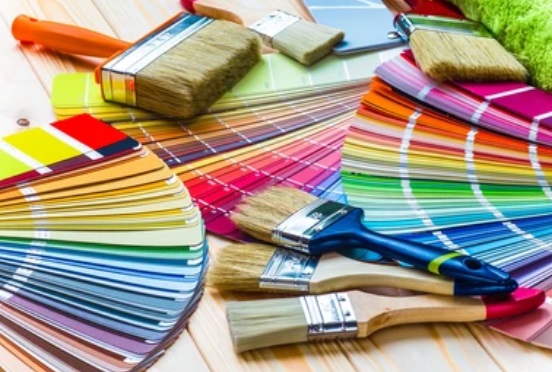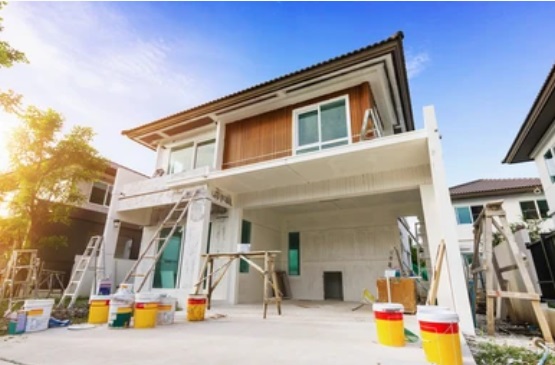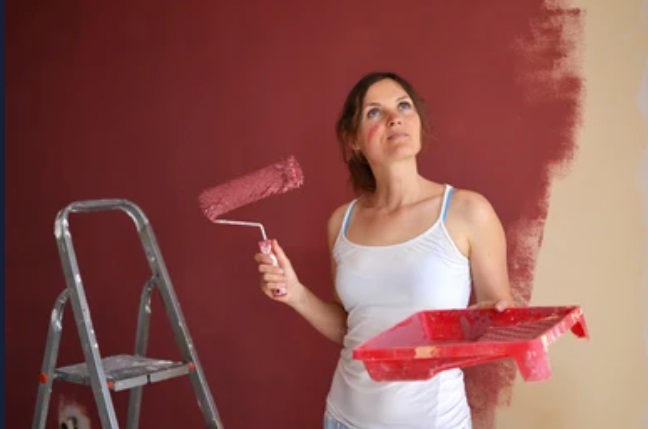Painting Your Home

You’re a homeowner who takes pride in your home. You wash the walls regularly, clean the skirting boards and manicure the gardens in detail from time to time. But lately you’ve been looking at the peeling wall paint and flaky ceilings, and you’re at a loss as to whether to hire a professional painter or attempt the job yourself.
Does this sound like you? Trust me. I’ve been there myself.
First things first. Hiring a professional to complete the painting of your home’s interior or exterior may seem the easier option, it can also mean waving ta-ta to a hefty sum of money…
How much does a professional painter cost?
Professional painters often charge per square metre, so let’s look at a breakdown of costs for professional house painting in Australia.
For a single colour with minimal prep work, the cost of painting the interior of a house in Australia is on average $20-$30 per square metre, ceiling included. Throw gloss architraves, multiple colours and separate ceiling trim colours into the mix, and you’re looking at over $30 per square metre. Interested in wallpapering or sponged effects? Well, the cost only continues to climb.
So at a glance, you’re looking at an out-of-pocket figure that looks like this:
Area for Painting | Minimum Cost | Maximum Cost (on. average) |
Interior of a 2 bedroom unit |
$2,500 |
$3,500 |
Exterior of a 2 storey home |
$5,500 |
$20,000 |
Roof |
$2,800 |
$4,500 |
Homeowners considering little more than a refresher coat or a whole new look for their home’s exterior can expect to pay anywhere from $15-$45 per square metre for brickwork, with timber exteriors costing $12-$60 per square metre. This means you’ll need to splurge a good $10,000-$20,000 for a 2-storey weatherboard home, whereas a 2-storey brick home can set you back $5,500 to $8,000.
And don’t forget, the condition of your interior and exterior walls make all the difference in how much you pay a professional to complete the job. The more work needed to deliver a top-notch result, the more you pay.
Want to avoid this significant financial outlay? Then let’s take a look at how to ensure your walls and ceilings receive the TLC they need before applying that first coat of paint, DIY style.
DIY Painting Preparation
Painting the interior of your home needn’t be intimidating. While the overall task is without a doubt overwhelming for first-time wall painters in particular, working out a plan of attack is the best first step you can take.
Start by:
1. Scrubbing the surface to prevent dirt and dust from making its way into the final coat.
2. Scrape and sand the walls to create a smooth surface.
3. Add a layer of primer paint.
And here is where the real fun begins. Once you’ve followed these three simple steps, it’s time to choose your colour scheme! But which paint is best for your home? Oil-based or water-based?
Paint, Paint and More Paint!
With so many different brands and paint products on the market these days, a once simple decision can take a lot of time of properly research. Let’s start by comparing oil and water-based paints.
The difference in these two paints comes down to two things: drying time and durability. While oil-based paints are more durable (which is why they’re often used for painting exteriors), they can take up to 24 hours to dry before you are able to apply a new coat.
Water-based paints on the other hand may be less durable, but are able to have multiple coats applied in one day due to the faster drying time. This is especially important to know if you are the owner of a rental property and are looking to complete an interior wall paint job before your open home later that week.
You’ll also need to consider what finish you’d like on the walls of your home. With options such as matte, gloss, eggshell or satin, you may want to speak to your local paint professional before making purchasing a tin from your chosen supplier.
How much will I need to spend on paint?
Remember that paint can be really expensive, so make sure you choose wisely. With a 1L tin of quality primer paint starting at approximately $38 and climbing to around $62 at the higher end of the scale, it is imperative you speak to a paint specialist and work out how much you will need to complete your job correctly the first time around.
Alternatively to work out the cost of painting your walls using a quality paint such as Dulux, check out this super handy calculator to help you budget your costs.
How often should I paint my house?
Top paint brands such as Dulux offer a 5-year guarantee on the quality of their paint products, and who doesn’t love a long-term guarantee? Getting your paint job right the first time around means less fuss in the short-term, and walls that you can be certain won’t look flayed and worn in a year’s time.
But here’s where it gets tricky. Exterior walls require a different approach, so to determine how often you need to paint the external walls of your home, you’ll need to take into account: Environmental factors such as climate
· Environmental factors such as climate
· Type of cladding on your house
· Quality of paint and primers previously used
· Quality of workmanship on previous paint job
If you’re sitting there thinking “But Kitty, how long will a quality exterior paint job last?” we need to circle back to thinking about the materials used on the outer walls of your home:
Material | Longevity |
Painted timber | 10 years (on average) or 2-3 years if near the coast |
Stained or finished timber |
2-5 years |
Painted weatherboard |
15 years (on average) |
So before you dive head first into the world of DIY painting or handing over that large sum of money to engage a professional painter, make sure you are able to make the commitment either way.
A DIY paint job – when done right, will save you money in the long-run and leave you with a sense of accomplishment, while a paint job from a qualified professional can give you peace of mind that the job will be completed properly, giving you more time to focus on the things that matter most to you.
Calculator
https://www.dulux.com.au/paint-calculator
Finally, it is possible to set-up a longer settlement period in a contract for sale, which gives you more time to find your next humble abode or extravagant dwelling in this competitive housing climate.




